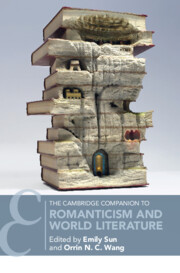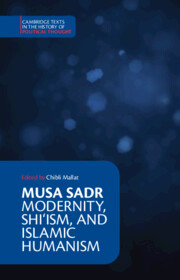Refine search
Actions for selected content:
3411324 results
The Other Nepal
- Alterity in Nepali Literature and Culture
- Coming soon
-
- Expected online publication date:
- December 2026
- Print publication:
- 30 April 2026
-
- Book
- Export citation
The Economic Growth of Southeast Asia
- Trade, Globalization and Development since 1870
- Coming soon
-
- Expected online publication date:
- October 2026
- Print publication:
- 01 July 2027
-
- Book
- Export citation
Fetal and Neonatal Brain Injury
- Coming soon
-
- Expected online publication date:
- October 2026
- Print publication:
- 31 October 2026
-
- Book
- Export citation

The Cambridge History of Irish Poetry
- Coming soon
-
- Expected online publication date:
- October 2026
- Print publication:
- 31 October 2026
-
- Book
- Export citation
Sergei Eisenstein in the Classical Tradition
- Coming soon
-
- Expected online publication date:
- September 2026
- Print publication:
- 30 September 2026
-
- Book
- Export citation
Locality and Agency in the Iron Age Mediterranean
- Coming soon
-
- Expected online publication date:
- September 2026
- Print publication:
- 30 September 2026
-
- Book
- Export citation
Healthcare Quality Measurement
- Coming soon
-
- Expected online publication date:
- August 2026
- Print publication:
- 31 August 2026
-
- Book
- Export citation
Healthcare Quality Measurement
- Coming soon
-
- Expected online publication date:
- August 2026
- Print publication:
- 31 August 2026
-
- Book
- Export citation
Geometric Quantum Field Theories
- Coming soon
-
- Expected online publication date:
- August 2026
- Print publication:
- 01 July 2027
-
- Book
- Export citation
Sexually Liminal Lives
- Chiyawali Koti Identities in Eastern India
- Coming soon
-
- Expected online publication date:
- August 2026
- Print publication:
- 01 July 2027
-
- Book
- Export citation

Introduction to Conservation Genetics and Genomics
- Coming soon
-
- Expected online publication date:
- August 2026
- Print publication:
- 31 August 2026
-
- Textbook
- Export citation
The Social Underpinnings of Political Discontent in Latin America
- Coming soon
-
- Expected online publication date:
- August 2026
- Print publication:
- 31 August 2026
-
- Book
- Export citation
The Tragedy of Soviet Market Economists
- The Failed Quest to Civilise Russia, 1972–2022
- Coming soon
-
- Expected online publication date:
- August 2026
- Print publication:
- 31 August 2026
-
- Book
- Export citation
A Student's Manual for A First Course in General Relativity, Third Edition
- Coming soon
-
- Expected online publication date:
- August 2026
- Print publication:
- 31 August 2026
-
- Textbook
- Export citation
Why Europe?
- The Great Divergence and the West's Rise to Global Predominance
- Coming soon
-
- Expected online publication date:
- August 2026
- Print publication:
- 01 July 2027
-
- Book
- Export citation

The Cambridge Companion to Romanticism and World Literature
- Coming soon
-
- Expected online publication date:
- August 2026
- Print publication:
- 31 August 2026
-
- Book
- Export citation
The Cambridge Handbook of the Minimalist Program
- Coming soon
-
- Expected online publication date:
- August 2026
- Print publication:
- 30 June 2026
-
- Book
- Export citation
Race in the Modern World
- An Intellectual History
- Coming soon
-
- Expected online publication date:
- August 2026
- Print publication:
- 31 July 2026
-
- Book
- Export citation

Marvell and Milton
- Poets in a Fallen World
- Coming soon
-
- Expected online publication date:
- August 2026
- Print publication:
- 31 August 2026
-
- Book
- Export citation

Musa Sadr: Modernity, Shi‘ism, and Islamic Humanism
- Coming soon
-
- Expected online publication date:
- August 2026
- Print publication:
- 31 August 2026
-
- Book
- Export citation
